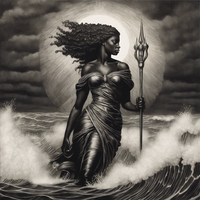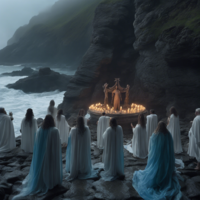Thalassa (planet): Difference between revisions
NewZimiaGov (talk | contribs) |
NewZimiaGov (talk | contribs) |
||
| Line 102: | Line 102: | ||
===Mythology: The Hymn of Thalassa=== | ===Mythology: The Hymn of Thalassa=== | ||
The Hymn | The Homeric Hymn to Thalassa, composed by the Bassaridian playwright Eliyahu al-Bashir, recounts the story of Callidrus, a proud sailor who defies Thalassa by seeking to conquer her domain. Ignoring her warnings, he sails into the Maelstrom of Aegiros to claim the sea’s treasures. Upon reaching the eye of the storm, Callidrus attempts to take a luminous pearl but is consumed by the Maelstrom, transformed into the Abyssal Sentinel, an eternal guardian of the ocean’s secrets. | ||
The hymn warns against the dangers of pride and greed, illustrating Thalassa’s dual nature as both nurturer and destroyer. It highlights the necessity of respecting the balance of nature and the limits of mortal ambition. | |||
The hymn | The hymn is recited during the Rite of the Tidal Communion and the Mehtap Dalgası (Moonlit Tide), reminding worshipers to honor Thalassa’s power and the lessons of humility and respect that her domain demands. | ||
===Worship and Festivals in Bassaridia Vaeringheim=== | ===Worship and Festivals in Bassaridia Vaeringheim=== | ||
Revision as of 17:42, 22 December 2024
| ||
| Orbital characteristics | ||
| Mass (Kg) | 8.90E+26 | |
| Radius (Km) | 87,770 | |
| Solar Day (h) | 7.83 | |
| Orbital Period (days) | 2,541 | |
| Semi-Major Axis (Km) | 5.01E+08 | |
| Periapsis (AU) | 3.27 | |
| Apoapsis (AU) | 3.5 | |
| Albedo | 0 | |
| Surface Temperature (K) | 110 | |
| Surface Gravity (m/s^2) | 7.71 | |
| Axial Tile (degrees) | 37.6 | |
| Inclination (degrees) | .38 | |
| Orbital Speed (Km/s) | 15 | |
| Satellites | Styx, Faun, Silenus | |
Thalassa is the planet sixth closest to the star Atos, and the second - and largest - of the system's four gas giants. It is also, furthermore, characterized by its distinct golden rings. After Azos and Tarsica, Thalassa is the most prominent body in the Micrasian night sky.
North Polar Regions
The North Polar region of Thalassa is characterized by its tranquil yet icy atmosphere. Unlike the turbulent poles of many gas giants, Thalassa's North Pole is relatively calm, featuring slow-moving cloud formations composed mainly of methane and ammonia ices. The temperature in this region is exceedingly low, resulting in a serene, almost otherworldly landscape dominated by shimmering ice clouds. This calmness allows for a more stable and clear view of the polar region, with fewer storms and atmospheric disturbances. Occasional auroras, caused by the interaction of Thalassa's magnetic field with solar winds, add a mesmerizing touch to the polar skies.
Equatorial Regions
Thalassa's Equatorial region is a stark contrast to its poles, marked by vibrant bands of blue and white clouds. The equator is the warmest part of the planet, receiving the most direct sunlight. This region experiences dynamic weather patterns, including massive thunderstorms and high-speed jet streams. The blue coloration is due to the scattering of sunlight by methane in the upper atmosphere. The presence of fast-moving jet streams creates sharply defined bands and contributes to the planet's visually stunning appearance.
Southern Polar Regions
The South Polar region of Thalassa is a mix of calm and chaotic elements. This region features a combination of smooth, icy clouds and sporadic storm activity. The South Pole is slightly warmer than the North Pole, allowing for the formation of larger and more complex cloud structures. This region is known for its unique polar hexagon, a six-sided jet stream that encircles the pole, creating a geometric cloud pattern. The hexagon's stability and persistence are subjects of scientific fascination, as it remains a mysterious and distinctive feature of Thalassa. The interplay between the hexagon and surrounding storm systems results in a captivating and dynamic polar environment.
Golden Rings
Thalassa's vibrant golden rings are a captivating feature of this gas giant, distinguished by their striking color and intricate structure. These rings are primarily composed of ice particles mixed with silicate dust and organic compounds, which reflect sunlight in a way that creates their characteristic golden hue. The particles range in size from tiny micrometers to larger chunks, and their composition is influenced by Thalassa's proximity to the star Atos. The rings' golden coloration is likely due to the presence of tholins, complex organic molecules formed through the irradiation of simple hydrocarbons by ultraviolet light. These tholins absorb blue and ultraviolet light, scattering the longer wavelengths that appear golden to human eyes. The rings are kept in place by the gravitational influence of Thalassa’s numerous moons, which shepherd and maintain the ring's defined edges through their orbital resonances. This delicate balance between the moons' gravitational forces and the centrifugal forces of the ring particles creates a dynamic and ever-changing but stable ring system that is as scientifically intriguing as it is visually stunning.
Moons
In addition to its three major moons, at least ten additional, lesser moons also orbit around Thalassa. Information regarding these newly discovered moons can be found in the table below
| Moon | Moon Image | Radius (km) | Mass (kg) | Solar Day (hours) | Orbital Period (days) | Semi-major Axis (AU) | Periapsis (AU) | Apoapsis (AU) | Albedo | Surface Temperature (K) | Surface Gravity (m/s²) | Axial Tilt (degrees) | Inclination (degrees) | Orbital Speed (km/s) |
|---|---|---|---|---|---|---|---|---|---|---|---|---|---|---|
| Bassaria |  |
250 | 4.8 × 10^20 | 20 | 15 | 0.002 | 0.0015 | 0.0025 | 0.3 | 150 | 0.4 | 5 | 2 | 1.5 |
| Thyrsia |  |
225 | 3.7 × 10^20 | 18 | 20 | 0.0025 | 0.002 | 0.003 | 0.28 | 145 | 0.35 | 7 | 3 | 1.3 |
| Nyssa |  |
200 | 2.8 × 10^20 | 22 | 25 | 0.003 | 0.0025 | 0.0035 | 0.32 | 140 | 0.3 | 4 | 4 | 1.1 |
| Ampelos |  |
175 | 2.0 × 10^20 | 24 | 30 | 0.0035 | 0.003 | 0.004 | 0.27 | 135 | 0.25 | 6 | 5 | 1.0 |
| Penthia |  |
150 | 1.3 × 10^20 | 26 | 35 | 0.004 | 0.0035 | 0.0045 | 0.29 | 130 | 0.2 | 8 | 6 | 0.9 |
| Silenia |  |
125 | 0.8 × 10^20 | 28 | 40 | 0.0045 | 0.004 | 0.005 | 0.25 | 125 | 0.15 | 10 | 7 | 0.8 |
| Icaria |  |
100 | 0.4 × 10^20 | 30 | 45 | 0.005 | 0.0045 | 0.0055 | 0.3 | 120 | 0.1 | 12 | 8 | 0.7 |
| Corythia |  |
75 | 0.2 × 10^20 | 32 | 50 | 0.0055 | 0.005 | 0.006 | 0.28 | 115 | 0.07 | 14 | 9 | 0.6 |
| Erigone |  |
50 | 0.1 × 10^20 | 34 | 55 | 0.006 | 0.0055 | 0.0065 | 0.26 | 110 | 0.05 | 16 | 10 | 0.5 |
| Ariadna |  |
37.5 | 0.05 × 10^20 | 36 | 60 | 0.0065 | 0.006 | 0.007 | 0.24 | 105 | 0.03 | 18 | 11 | 0.4 |
Mythology
Origin
Thalassa, the Lady Divine of the Sea and War, stands as the most powerful of all the Planetary Divines in the Reformed Stripping Path. Born from the tears of Atos, shed when the sun was punished for stealing light from Azos, Thalassa embodies the dual nature of the ocean: nurturing and life-giving, yet fierce and destructive. Her influence spans the maritime realms, inspiring sailors, warriors, and mystics who seek her favor and protection.
Thalassa in the Reformed Stripping Path
Within the Reformed Stripping Path, Thalassa is revered as the sovereign force of the seas and a divine warrior. She symbolizes strength, resilience, and adaptability, embodying the eternal struggle and harmony between creation and destruction. Her teachings urge followers to navigate the unpredictable tides of life with courage and skill, while respecting the power and mystery of the ocean’s depths.
Thalassa’s role as a protector and a destroyer makes her a patron of those who defend their homes and livelihoods against natural and supernatural threats. Worshipers invoke her guidance in times of peril, seeking her strength and wisdom to overcome challenges both on and off the water.
Thalassa in the Bassaridian Zodiac
Thalassa governs the Zodiac of Thalassian, the seventh sign of the Bassaridian Zodiac and the second zodiac of the month of Thalassiel. This zodiac is associated with the Host Star Wedíos, which shines prominently at approximately 54°N latitude. Wedíos symbolizes favorable breezes, safe voyages, and skilled navigation, aligning with Thalassa’s domain over the seas and her role as a guide through life’s turbulent waters.
The zodiac of Thalassian is a time of reflection on the balance between risk and reward, urging followers to embrace the challenges of navigation, whether across physical seas or metaphorical journeys. Under Wedíos’ light, worshipers of Thalassa seek her favor for successful ventures and the courage to steer through treacherous waters.
Azure Sentinel Sect
The Azure Sentinel Sect, based in Vaeringheim, is the sacred order dedicated to Thalassa. This sect is composed of skilled sailors, courageous warriors, and devoted mystics who protect the waters and preserve ancient Bassaridian maritime traditions.
Members of the sect, known as Sentinels, are masters of seamanship and maritime magic, harnessing the elemental forces of wind and water. They act as guardians of coastal communities, ensuring safe passage for travelers and defending against supernatural threats that emerge from the deep. The Azure Sentinel Sect is central to Thalassa’s worship, embodying her values of protection, skill, and strength.
Mythology: The Hymn of Thalassa
The Homeric Hymn to Thalassa, composed by the Bassaridian playwright Eliyahu al-Bashir, recounts the story of Callidrus, a proud sailor who defies Thalassa by seeking to conquer her domain. Ignoring her warnings, he sails into the Maelstrom of Aegiros to claim the sea’s treasures. Upon reaching the eye of the storm, Callidrus attempts to take a luminous pearl but is consumed by the Maelstrom, transformed into the Abyssal Sentinel, an eternal guardian of the ocean’s secrets.
The hymn warns against the dangers of pride and greed, illustrating Thalassa’s dual nature as both nurturer and destroyer. It highlights the necessity of respecting the balance of nature and the limits of mortal ambition.
The hymn is recited during the Rite of the Tidal Communion and the Mehtap Dalgası (Moonlit Tide), reminding worshipers to honor Thalassa’s power and the lessons of humility and respect that her domain demands.
Worship and Festivals in Bassaridia Vaeringheim
The Rite of the Tidal Communion
The Rite of the Tidal Communion is a sacred ceremony performed during the changing of the tides, when Thalassa’s presence is believed to be strongest. Worshipers gather at a coastal shrine overlooking Lake Morovia, adorned with seashells, pearls, and symbols of the ocean and war.
Participants chant ancient hymns, offer sacrifices of wine and treasures, and enter a meditative trance induced by sacred herbs and Noctic-Rabrev. As the tides rise, they extend their prayers to Thalassa, seeking her blessings for strength, guidance, and protection.
Mehtap Dalgası (Moonlit Tide)
Held on the 80th day of the year, the Mehtap Dalgası, or Moonlit Tide, is a grand festival in Aurelia celebrating Thalassa’s power over the seas. This event features processions of sailors and mystics carrying conch shells and banners, alongside maritime competitions that showcase seamanship and courage. The festival concludes with a moonlit gathering by the water, where worshipers light floating lanterns to honor Thalassa and her guidance.
Epithets
Thalassa is adorned with epithets that reflect her immense power and influence. She is known as the Mistress of the Deep, symbolizing her dominion over the ocean’s mysteries, and the Sovereign of Storms, highlighting her command over nature’s fury. As the Empress, she is revered as the supreme figure among the Planetary Divines, embodying authority and majesty.
Iconography and Depictions
In art and iconography, Thalassa is often depicted as a regal figure adorned in flowing azure robes, her form surrounded by mist and crashing waves. She wields a trident, symbolizing her mastery over the seas and her role as a divine warrior.
Thalassa’s closed eyes are a recurring motif, signifying her power to drive mortals and beasts into a frenzy of war with her unseen gaze. Symbols associated with her include the Conch, representing the vast depths of her domain, and the Atteran River Shark, embodying her fierce and untamed nature.
Depictions of Thalassa capture her majestic presence and the awe-inspiring duality of the sea, inspiring worshipers to honor the beauty and power of the maritime realm.
The Divine Court of Empress Thalassa
In addition to the Planetary Divines and the Host Stars, some practitioners of the Reformed Stripping Path - especially members of the Azure Sentinel Sect - may pray to the Divine Court of the Empress Thalassa in order to receive additional blessings. They often seek counsel from Thyrsia, the Noble Counselor, for strategic insights and from Nyssa, the Keeper of Secrets, to uncover hidden truths. The Sentinels also revere Bassaria for her eloquent proclamations, which they believe enhance their own rituals and teachings. Ampelos, the Divine Healer, is invoked in his healing practices, while Penthia's protective blessings are sought during their sacred journeys. To this end, the Divine Court therefore play a role which is similar to that of the Host Stars, with the major difference that the members of the Divine Court are revered as minor deities, while the Host Stars are not regarded as gods except in the case of certain specific, fringe cults.
The Divine Court of Empress Thalassa is organized as follows:













